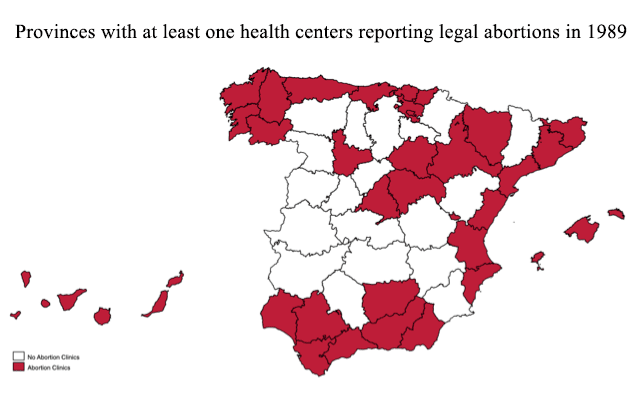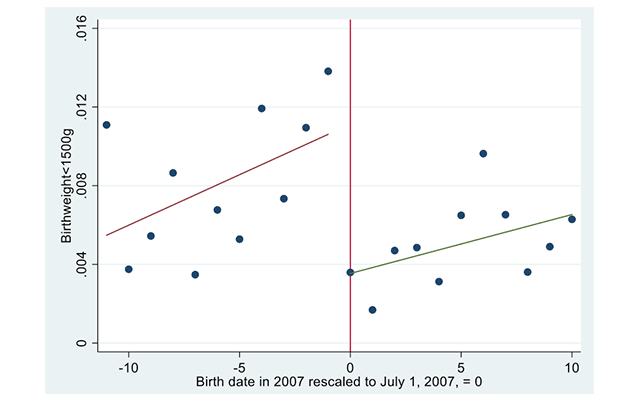The "la Caixa" Foundation supports ground-breaking research at the Barcelona School of Economics through the "la Caixa" Foundation Research Grants on Socioeconomic Well-being.
Project overview
This project aims at understanding how do early shocks affect health and human capital formation during childhood (the so-called "missing middle"). Specifically, the project asks: How do the effects of different types of interventions, or shocks at different ages, compare? What are the most cost-effective ways of improving young children's future outcomes? The project will take advantage of several natural experiments in a country, Spain, for which high quality administrative data are available for the past 35 years, to evaluate credibly and precisely the causal effects of several different public policies and shocks on child development. Results will help us understand how shocks in early life can have long-term effects on human capital, with direct policy implications.
Main results
- Provide credible estimates of the causal effect of a major national reform in the legal regulation of abortion on long-term outcomes for women
- First to show that more generous paternity leave can have negative effects on fertility
- First to provide strong causal evidence comparing the effects on child health of a benefit paid after the birth of a child, versus before the mother is pregnant
Summary, output, and dissemination
- Research summary
-
The project analyzed three interventions: the introduction of a universal child benefit in Spain in July 2007, the introduction of two weeks of paid paternity leave in March 2007, and the legalization of abortion in 1985. A fourth intervention dealing with medical treatments around birth is still being analyzed.
1) The effects of legalizing abortion
The researchers found that that after abortion was legalized in Spain in 1985, birth rates fell, especially among young women. They also found a decrease in the number of marriages involving very young women. These effects were more pronounced in provinces where abortion services were being provided since the early years after legalization (versus provinces where no health centers reported performing abortions in the early period after legalization).
Source: Anuarios from the Spanish Health Ministry.
The researchers follow the affected cohorts of women over time, and find that the short-term fall in births did not translate into lower completed fertility. Births and marriages were delayed, but eventually women caught up, and women who had early access to abortion were less likely to divorce, probably because they married later and formed couples that were better matched.
The evidence also suggests that women who were able to avoid an early birth thanks to legal abortion were more likely to complete high school, and their long-term earnings were higher.
These results show that limiting access to abortion may have important short- and long-term consequences for women, without actually increasing completed fertility.
2) The effects of paternity leave
The researchers first analyzed the effects of the introduction of paternity leave in Spain on parents’ outcomes. The main and surprising result was that families where the father was eligible for paternity leave after the birth of a child in 2007 were less likely to have another child in the future, compared with families where the father was not eligible for paternity leave. This may be because mothers go back to work earlier in households where the father can take paternity leave, but also because affected fathers have lower desired fertility.
The study found that affected fathers spend more time on childcare even several years after the birth of the child. It then analyzed the effect of paternity leave on child development and found that children whose fathers were eligible for paternity leave have higher grades in math in primary school. No effect on language grades was found. There was some evidence suggesting that affected children may have more progressive views towards gender roles, possibly driven by their fathers’ greater involvement in childcare and housework. This second part of the project is still ongoing, with only preliminary results so far.
3) The effects of family subsidies on children
The project examines the effect of a generous child benefit on children’s health and cognitive development. First the researchers compare children who were born just before and just after the introduction of a universal child benefit in Spain in 2007. They find no significant difference in health outcomes for children whose mothers received the benefit, compared with those who didn’t, at ages 0 to 8. This is found both when using hospitalization data (Figure 3), and data from the primary health care system (doctor visits, prescriptions, height and weight, etc). They also find no significant differences in grades in primary school in any subject. Thus, they conclude that receiving the benefit (after the birth of the child) had no short or medium-term effects on health, and no medium-term effects on cognitive development.
In a second analysis, the researchers study effects on health for the younger siblings of the children born around the benefit introduction date in 2007. The question is now whether the mother receiving the benefit (in 2007) had any effect on the health at birth of the next child. A recent literature suggests that targeting pregnant women may be more effective than subsidies after the birth of the child, given the importance of fetal development and newborn health. The researchers hypothesize that prenatal effects may be even stronger if vulnerable women are targeted even before they are pregnant.
They find that low-income women who received the benefit after having a child in 2007 were less likely to have a low-birthweight baby in their following pregnancy.
4) Medical treatments around birth
The researchers started collecting data on doctors and nurses, as well as children’s health outcomes, from Peru. A reform in 2008 changed the way that doctors and nurses were assigned to different health centers in poor, rural areas. The goal is to determine the effect on children’s health of being (quasi-randomly) assigned to better-quality doctors and nurses. The data collection is now complete, but no final results have been produced yet.
Source: Birth-certificate data.
- Competitive European funding
-
The principal investigator Libertad González has been awarded an ERC Consolidator Grant of more than 1 million euros for an extended version of this project, starting in March 2018.
- Publications and working papers
-
- “Does Paternity Leave Reduce Fertility?” (with Lidia Farré). Journal of Public Economics 172: 52-66 (2019).
- “The Effect of Abortion Legalization on Fertility, Marriage and Long-Term Outcomes for Women” (with Sergi Jiménez, Natalia Nöllenberger & Judit Vall) Barcelona School of Economics Working Paper.
- Conferences, workshops and seminars
-
Conference presentations
- European Association of Labour Economists (EALE) Annual Meeting, Uppsala, September 2019
- European Society for Population Economics (ESPE) Annual Meeting, Bath, June 2019
- Society of the Economics of the Household 3rd Annual Meeting, Lisbon, May 2019
- Simposio de Análisis Económico (SAE) Annual Meeting, Madrid, December 2018
- European Association of Labour Economists (EALE) Annual Meeting, Lyon, September 2018
- IZA World Labor Conference, Berlin, June 2018
- European Society for Population Economics (ESPE) Annual Meeting, Antwerp, June 2018
- Society of the Economics of the Household 2nd Annual Meeting, Paris, May 2018
- AEA/ASSA Annual Meeting, Philadelphia, January 2018
Workshop presentations
- “Workshop in Gender Economics: Parenthood and Careers in the Nordics” Swedish Institute for Social Research, Stockholm, September 2019
- "The importance of early-life circumstances: Shocks, parents and policies", Copenhagen, September 2019
- Workshop on Health Economics, MOVE and Ramón Areces, Barcelona, November 2017
- Ifo Workshop on Economic Uncertainty and the Family, Munich, October 2018
Invited Seminars
2019
- INED (Paris)
- IAB (Nuremberg)
- Antwerp
- University of Sheffield
- CESifo Munich
2018
2017



